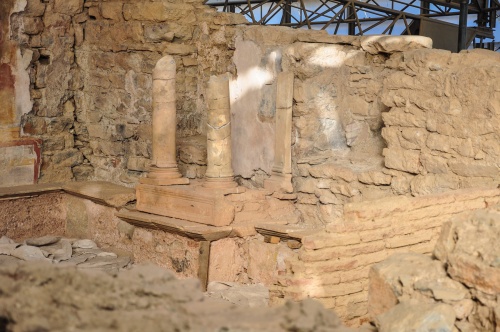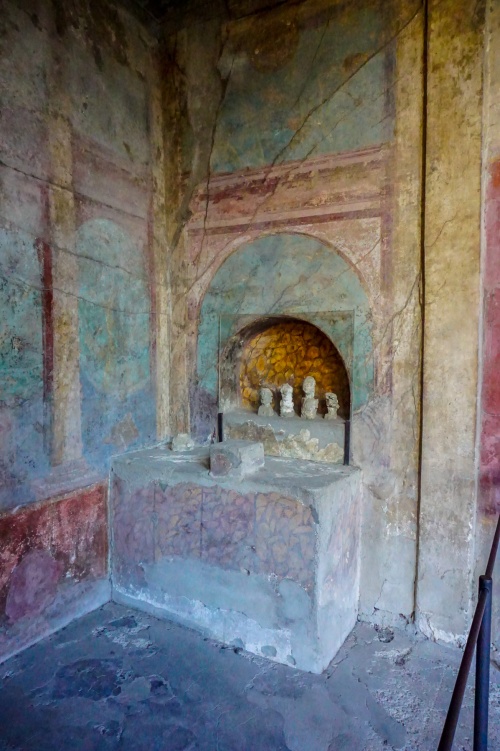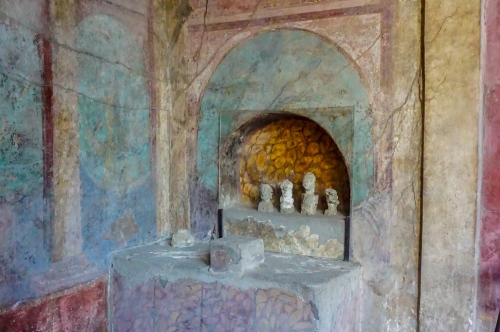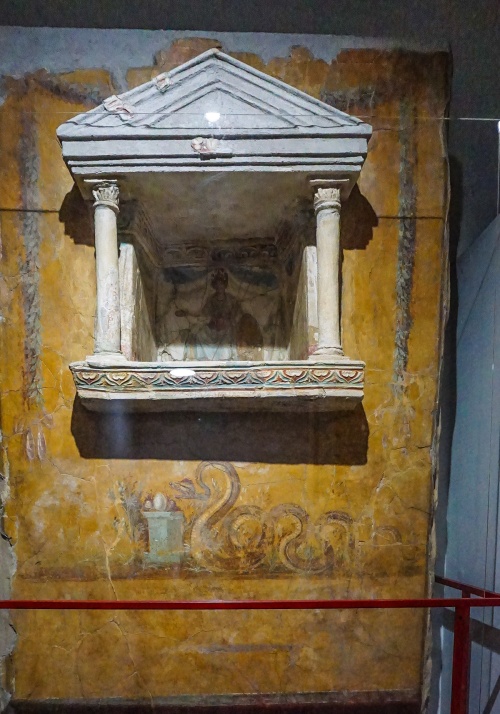One of the places that we like to visit on our In the Footsteps of Paul: Turkey and Greece trips are the “Terrace Houses” at Ephesus. In studying these well–preserved houses (domus) it is possible to get an idea of how the “elite” lived in the late Roman Period.

Ephesus: This aedicula/Lararium is the small structure in the center of the image embedded in the wall with two columns in front of it. Evidently here, the household gods were worshiped.
One of the features of these types of houses are small shrines (aedicule) called Lares domestici (see Hurtado pp. 46, 56 below). It is well–known that the Romans worshiped many “high” deities such as Jupiter/Zeus, Baccus/Dionysus, etc. . . . but not as much attention is given to the worship of the “lesser” deities such as lares.
. . . Lares functioned as guardians over various settings. The most common were domestic Lares of each household (Latin: Lares domestici), which represented spirits of family dead who had been elevated to a special kind of spiritual existence on account of their goodness and/or importance. These spirits protected the family, and all members of the household were expected to reverence them daily in offerings and prayers at the Lararium, a small altar typically placed in the Roman house. . . . In comparison to the more well–known gods, the Lares . . . figured much more frequently in the day–to–day ritual life of people.
. . . . members of Roman households, the family and their slaves too, gathered daily to reverence the household Lares. (Hurtado pp. 46–47).
Question: is this common practice of worshiping the Lares reflected in the New Testament?

One of the well–preserved Lararium at Pompeii—including the “household deities” that were worshiped here.
Because of the sudden destruction of Pompeii in August A.D. 79 when the volcano Vesuvius erupted a good number of Lararium have been preserved there.
From the New Testament, we realize that believers in Jesus included people from all social classes, ethnic backgrounds, occupations, males and females, etc.
The most significant feature of the Roman household (familia) was that its power was concentrated in the hands of the male head, the paterfamilias. The members of the household were those persons over whom the paterfamilias had power. . . .The Roman household normally was composed of husband, wife, unmarried children, slaves, freedmen, and clients . . . . (Jeffers p. 238)
Given that the worship at the Lararium occurred daily, and that all in the household were expected to participate, how would individual converts to Christianity deal with this?
If the paterfamilias—to whom all in the household owed their allegience—converted to Christianity, would he abandon the worship of the Lares? If so, how would his non-Christian wife, sons, daughters, spouses, even slaves have reacted to this abandonment of such a well-entrenched custom? Would he even be shunned by his “non–Christian clients” who had owed their allegiance to him? Would the paterfamilias “force” (because of his status) his household to follow his new found faith?
What if the wife of the paterfamilias converted, but her husband did not? Would she disrespect her husband and his ancestors by refusing to participate in this daily ritual? What would be the consequences of such an action? What about individual children who converted but now would not participate in this worship?
And what about the servants or slaves that were part of the household who worshiped only Jesus? I would guess that they would be severely punished because of showing disrespect to the paterfamilias.
“The snake, associated with the land’s fertility and thus prosperity, approaches a low laden altar.” (Wikipedia “Lares”)
I am surprised that this “problem” does not seem to be addressed in the pages of the New Testament.
Hurtado, Larry W. Destroyer of the gods — Early Christian Distinctiveness in the Roman World. Waco, Texas: Baylor University Press, 2016.
Jeffers, James S. The Greco–Roman World of the New Testament — Exploring the Background of Early Christianity. Downers Grove, IL: InterVarsity Press, 1999.



Could the later practice of ‘venerating’ (not ‘worshipping’ – according to those who do this an important distinction) the saints throw light on the questions you ask? So, it is not mentioned because the veneration of ancestors was not seen as worship… Early Christians were so radical about some things perhaps there needed to be others where they were (to modern eyes) more ‘tollerant’?